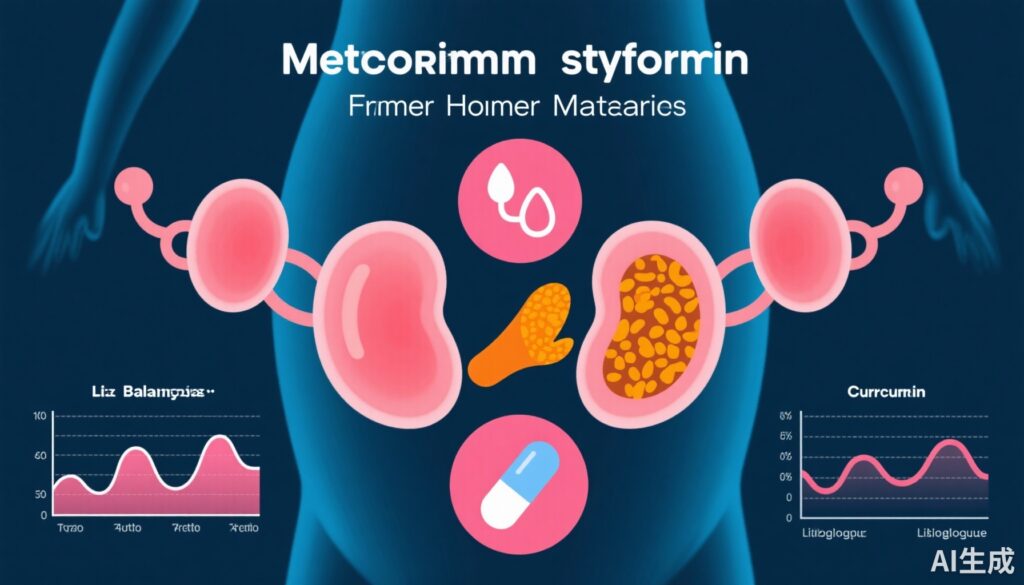Study Background and Disease Burden
Polycystic ovary syndrome (PCOS) is one of the most prevalent endocrine disorders affecting women of reproductive age worldwide. Characterized by anovulation, hyperandrogenism, and polycystic ovarian morphology, PCOS is often accompanied by significant metabolic derangements including insulin resistance, dyslipidemia, and obesity. These metabolic abnormalities increase the risk of type 2 diabetes mellitus, cardiovascular disease, and infertility, substantially impacting women’s health and quality of life. Despite available treatment options, many therapeutic approaches target isolated features of PCOS rather than exert broad metabolic and hormonal benefits. Metformin, an insulin-sensitizing agent, and curcumin, a bioactive polyphenolic compound with anti-inflammatory and antioxidant properties, have individually shown efficacy in modulating insulin resistance and lipid imbalances in PCOS. However, their combined impact had not been fully elucidated prior to this factorial clinical trial. Given the multifactorial nature of PCOS, combination therapies addressing multiple pathogenic pathways simultaneously are of high clinical interest to improve comprehensive outcomes.
Study Design
Feghhi et al. conducted a robust randomized, double-blind, placebo-controlled, factorial clinical trial to evaluate the effects of metformin and nanocurcumin alone and in combination among women diagnosed with PCOS. Two hundred women with PCOS were randomized in a 1:1:1:1 manner into four groups: metformin plus placebo, nanocurcumin plus placebo, combination of metformin and nanocurcumin, or double placebo. The chosen dosages were metformin at 500 mg every 8 hours and nanocurcumin soft gel capsules at 80 mg every 8 hours administered for 12 weeks. The primary endpoints included changes from baseline in lipid profiles (total cholesterol, LDL, HDL, triglycerides), glucose metabolism markers, and hormonal parameters (testosterone, follicle-stimulating hormone [FSH], luteinizing hormone [LH]). Secondary endpoints assessed changes in body weight and body mass index (BMI). All assessments were conducted at baseline and at the end of the 12-week intervention period.
Key Findings
The study yielded compelling evidence that combination therapy significantly outperformed individual agents and placebo across various metabolic and hormonal parameters.
- Lipid Profiles: The combined metformin and curcumin group experienced statistically significant reductions in low-density lipoprotein (LDL) cholesterol, total cholesterol (TC), and triglycerides (TG), accompanied by a rise in high-density lipoprotein (HDL) cholesterol compared to monotherapies and placebo. This improvement suggests a potent synergistic effect on lipid metabolism, which is crucial for cardiovascular risk mitigation in PCOS.
- Glucose Metabolism: Markers of glucose regulation, including fasting glucose levels and insulin sensitivity indices, showed meaningful improvement in the combination group, exceeding the effects observed with metformin or curcumin alone. This finding underscores the additive benefit of targeting insulin resistance through dual pathways involving metformin’s insulin sensitization and curcumin’s antioxidant activity.
- Hormonal Parameters: Significant reductions in circulating testosterone levels were documented in the combination group, consistent with amelioration of hyperandrogenism—a central pathophysiological feature of PCOS. Furthermore, improved normalization of FSH and LH levels indicated better ovulatory hormonal balance, which may correlate with improved reproductive potential.
- Body Weight and BMI: Combination therapy was associated with the greatest decreases in body weight and BMI over the 12 weeks, surpassing reductions achieved by monotherapy or placebo. This synergistic effect may result from enhanced metabolic control and appetite regulation by these agents.
No serious adverse events were reported, and the therapeutic regimens were generally well tolerated.
Expert Commentary
This study provides valuable clinical evidence supporting the combined use of metformin and curcumin in women with PCOS, illustrating how complementary mechanisms may provide enhanced efficacy. Metformin improves peripheral insulin sensitivity and reduces hepatic gluconeogenesis, while curcumin exhibits potent anti-inflammatory and antioxidant effects, potentially mitigating oxidative stress implicated in PCOS pathogenesis. The factorial design strengthens causal inference by disentangling individual and combined agent effects.
Importantly, the use of nanocurcumin addresses bioavailability challenges commonly associated with curcumin supplementation, promoting better therapeutic outcomes. The significant improvements in both metabolic and hormonal parameters suggest a well-rounded intervention capable of addressing PCOS’s multifaceted nature.
Limitations include the relatively short duration (12 weeks) and study population restricted to women meeting specific PCOS criteria, which may limit generalizability. Longer-term studies with diverse cohorts are warranted to establish sustained efficacy and safety. Additionally, mechanistic investigations could elucidate the pathways underlying the observed synergies.
Current clinical guidelines emphasize metformin’s role primarily for metabolic complications in PCOS, while curcumin remains investigational. This study paves the way for expanding therapeutic strategies to include nutraceutical adjuncts, potentially enriching individualized PCOS management.
Conclusion
The combination of metformin and nanocurcumin demonstrates superior therapeutic efficacy in improving lipid profiles, glucose metabolism, hormonal regulation, body weight, and BMI in women with PCOS compared with monotherapy or placebo. These findings highlight the synergistic potential of combining a pharmacologic insulin-sensitizer with a bioavailable antioxidant compound for multifaceted intervention in PCOS. Incorporating such combination therapy could enhance clinical outcomes and target the complex metabolic and endocrine disruptions characteristic of PCOS. Further clinical trials with extended follow-up and mechanistic insights are essential to consolidate these findings and translate them into routine clinical practice for comprehensive PCOS management.
References
Feghhi F, Ghaznavi H, Sheervalilou R, Razavi M, Sepidarkish M. Effects of metformin and curcumin in women with polycystic ovary syndrome: A factorial clinical trial. Phytomedicine. 2024 Dec;135:156160. doi: 10.1016/j.phymed.2024.156160
Diamanti-Kandarakis E, Dunaif A. Insulin resistance and the polycystic ovary syndrome revisited: an update on mechanisms and implications. Endocr Rev. 2012;33(6):981-1030. doi:10.1210/er.2011-1034
Azziz R et al. Polycystic ovary syndrome. Nat Rev Dis Primers. 2016 Jul 21;2:16057. doi: 10.1038/nrdp.2016.57
Salehi B et al. Therapeutic Potential of Curcumin and Its Nanoformulations for the Treatment of PCOS: A Review. Nutrients. 2021;13(7):2214. doi:10.3390/nu13072214



